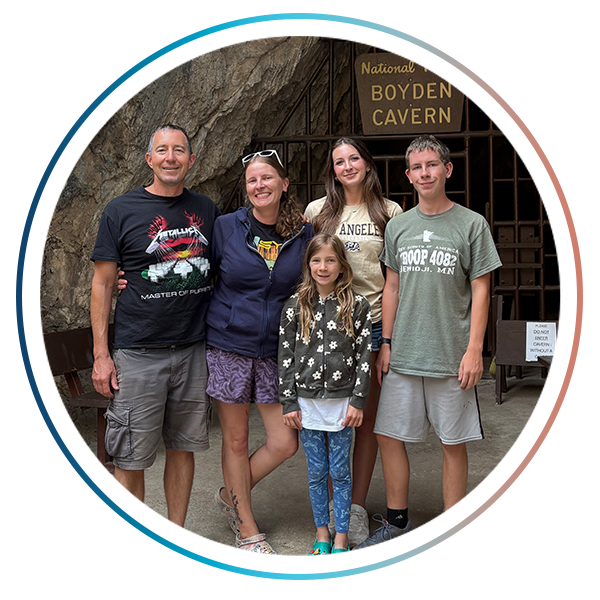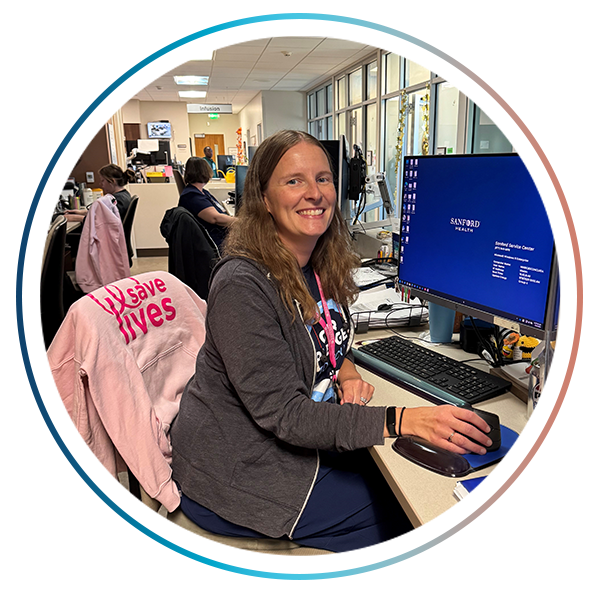As a registered nurse at the Sanford Joe Lueken Cancer Center in Bemidji, Kate Bates has dedicated her career to caring for cancer patients. She never dreamed she would become one.
But after her own breast cancer diagnosis in 2023, Kate found herself on the other side of care — confronting the same fears and uncertainties her patients often shared.
In the days and months after her diagnosis, Kate experienced the Joe Lueken Cancer Center in new ways. She witnessed the power of teamwork and coordinated care. She leaned on the compassion of her colleagues. She gained new perspective. And she felt gratitude for the lifesaving equipment and technology made possible through philanthropy.
Now healthy and cancer free, she’s sharing her story in recognition of Breast Cancer Awareness Month — hoping her experience will raise awareness and inspire support for local breast health.
The Power of Early Detection
With no family history of breast cancer, Kate didn’t have any concerns going in for her first mammogram in 2020 after turning age 40.
Then, she got a call.
“There was a spot on that mammogram they wanted to watch,” she said. “So going forward, I had diagnostic follow-up mammograms every six months.”
Then in 2023, shortly before her 42nd birthday, Kate got another call.
“My mammogram showed a new spot,” she said. “My doctor talked to me that day and recommended we do a biopsy.”
“The breast clinic navigator came to talk to me and gave me a lot of information about what results could be. She walked me through a procedure called mammogram-guided biopsy.”
The procedure, made possible thanks to state-of-the-art equipment supported in part by philanthropy, is typically used when an abnormality is identified on a mammogram but cannot be located using ultrasound.
A short time later, she got the call from her primary care doctor.
“I knew the fact she was calling that it wasn’t good,” Kate said. “I remember thinking, ‘Here we go.’ I remember feeling scared and anxious. I remember thinking about my family and my kids.”

Kate quickly turned to her colleagues for their insights and advice.
“I showed the results to the nurse practitioners I work with. They told me it was stage 0, so I knew I wouldn’t need chemo. I had a sense for what I’d be dealing with. The team here was great at reassuring me that with early detection and treatment, my outlook would be good.”
A short time later, Kate received her official diagnosis: ductal carcinoma in-situ (DCIS), an early form of breast cancer that forms in the milk ducts of the breast but has not yet spread into surrounding breast tissue. Because it is contained within the ducts, it is sometimes called “stage 0” breast cancer.
In November, Kate had surgery to remove the lump and surrounding tissue, along with the spot her doctor had been monitoring for the last two years.
Because DCIS can increase the risk of developing invasive breast cancer later on, Kate also underwent a course of preventative precision radiation following surgery, another type of leading-edge treatment designed to minimize the side effects of traditional radiation therapy.
Going forward, she will receive an annual breast MRI for the next five years along with yearly mammograms.
New Perspective
During her cancer journey, Kate continued to work as a registered nurse in medical oncology, providing education to patients prior to beginning chemotherapy, monitoring patient labs and coordinating as-needed care after chemo, such as blood transfusions, scans and hospital stays.
But navigating her own cancer journey caused her to see her work through a different lens.
“What I went through feels minor compared to what I see other patients go through, but my experience has caused me to look at the cancer experience differently,” she said.
“I think of how I felt when I was waiting on results. I have a better sense for how that feels for our patients. I was lucky in that I knew medical terminology, and I could walk across the building and ask my colleagues questions. That helps me appreciate what it’s like for patients who are not in health care. It’s easier now to put myself in my patients’ shoes.”
Her experience also made her grateful in other ways.

Being an Advocate
Today, Kate shares her story often to remind others of the importance of annual mammograms.
“I would not have been able to feel this cancer on a self-breast exam,” Kate said. “Yes, it was stage 0 so it won’t spread, but I am more prone to cancer now. So without being vigilant and getting screened, I could have been impacted by another type of cancer.”
“I like to tell my story because I know it inspires people to be aware and to book their mammograms,” she said.
Give for Good
Today, breast cancer affects one in eight women, along with thousands of men each year. With your support, we can improve access to lifesaving screenings, accelerate advances in research and give meaningful strength and support to local patients fighting this devastating disease right now.
When you give through the Sanford Health Foundation, 100% of your donation will support breast cancer care and research in your community:
-
- Services like Nurse Navigation, offering guidance and support from day one of a diagnosis
- Complimentary wigs and head coverings
- Leading-edge equipment like 3D mammography machines and mobile mammography services, offering the most advanced early-detection technology
- Cutting-edge research and clinical trials
- Items that provide patient comfort and support
- And so much more!